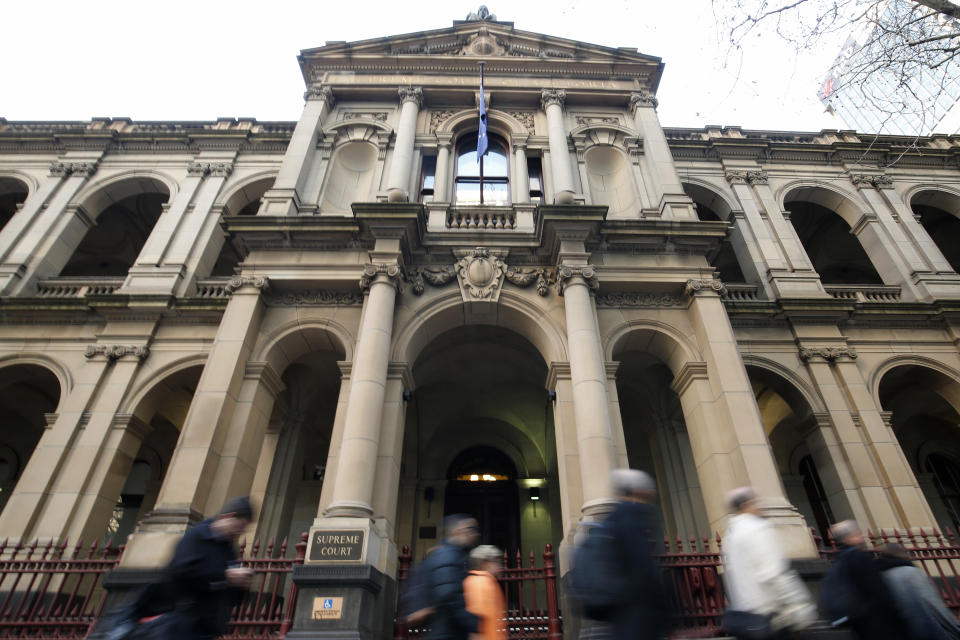Law gagging rape survivors in Victoria slammed as 'step back'
Advocates have come out swinging against changes to Victorian court law that prohibit rape and sexual assault survivors from speaking publicly about their experience without a specific court order.
The changes to open-court laws were quietly enacted in February, and mean survivors of family violence and sexual assault who want to speak publicly about their experiences must seek a court order for permission to reveal their identity.

The changes apply where charges have been laid and proceedings are pending, and in cases where a conviction has been made.
In other words, if the court finds a perpetrator guilty of sexual assault, their victim is not legally allowed to identify themselves in the media or online.
If the victim or accuser wants to speak, they must obtain a court order – a process which can cost thousands of dollars.
Advocacy group calls for change to law ‘costing survivors thousands of dollars’
The issue was slammed by advocacy movement Let Us Speak, previously Let Her Speak, a campaign that overturned similar laws in the Northern Territory and Tasmania. In that case, the campaign was tackling ‘hangover’ laws from a different time rather than fresh legislation.
The campaign was formed in partnership with Marque Lawyers, End Rape On Campus Australia and the Rape and Sexual Assault Research and Advocacy initiative.
A GoFundMe set up by Let Us Speak is aiming to raise $20,000 to help three survivors appeal their gag orders. In just seven hours it has raised over half of its target, sitting at $13,557 at the time of publication.

In the fundraiser’s description, the movement’s leader, survivor and journalist Nina Funnell called on the Victorian government to amend the laws to allow survivors the option to speak out if they wish.
“Victorian survivors of sexual assault deserve to be heard,” she wrote.
“Today, I’m launching the #LetUsSpeak Victoria campaign to insist the Victorian Government amend these new laws and allow all survivors of sexual assault and abuse the option to waive their right to anonymity – if they so choose – and speak out about their experiences.”
The advocate also expressed concern that high-profile survivors and advocates are now unable to continue to share their stories, pointing to famous instances of institutional sexual assault in the state.
“The Ballarat survivors, victims of clergy abuse, and other public survivor advocates are among those who have lost the right to speak and could now face contempt of court if they continue their campaigns or media work,” she wrote.
“As a result of the new laws, these survivors and others are now being forced to return to court at their own expense and inconvenience, to obtain court orders to speak publicly about their cases.
“This can and is costing survivors thousands of dollars.”
Under the new laws, publications and individuals who expose their identities without a court order face fines and jail time.
An individual found guilty of breaking the law risks fines and jail time, or even both with a maximum of $3304 or four months in jail at stake.
A corporation that breaks the law can be fined up to $8261.
Victorian Government willing to revisit laws

The Victorian government has since responded and says it's willing to revisit the laws.
Victoria's Attorney-General Jill Hennessy says the changes had been designed to make it easier for survivors.
But she has now asked the justice department to look at whether additional tweaks are needed following the very public concerns raised by Let Us Speak and survivors.
"I acknowledge the strength and resilience of victims who come forward and tell their stories – it is an incredibly brave and difficult thing to do," the minister said in a statement on Wednesday.
Ms Hennessy said the changes were brought in because survivors previously didn't have a clear way to navigate court bans designed to protect their identities.
"I remain concerned about the barriers, both cultural and legal, that continue to exist for victims of sexual assault," the minister said, pointing to the Victorian Law Reform Commission's review of laws relating to sexual assault.
Nina writes that in giving victims the right to tell their stories, the blame is shifted rightfully from victim to perpetrator.
“There is power in survivors sharing their stories in their own names – it shifts shame and it shifts blame from the survivor to the offender. And it empowers others to come forward,” she concluded.
Additional reporting by AAP
For sexual assault and family and domestic violence support you can call 1800respect on 1800 737 732.

 Yahoo Lifestyle
Yahoo Lifestyle 



